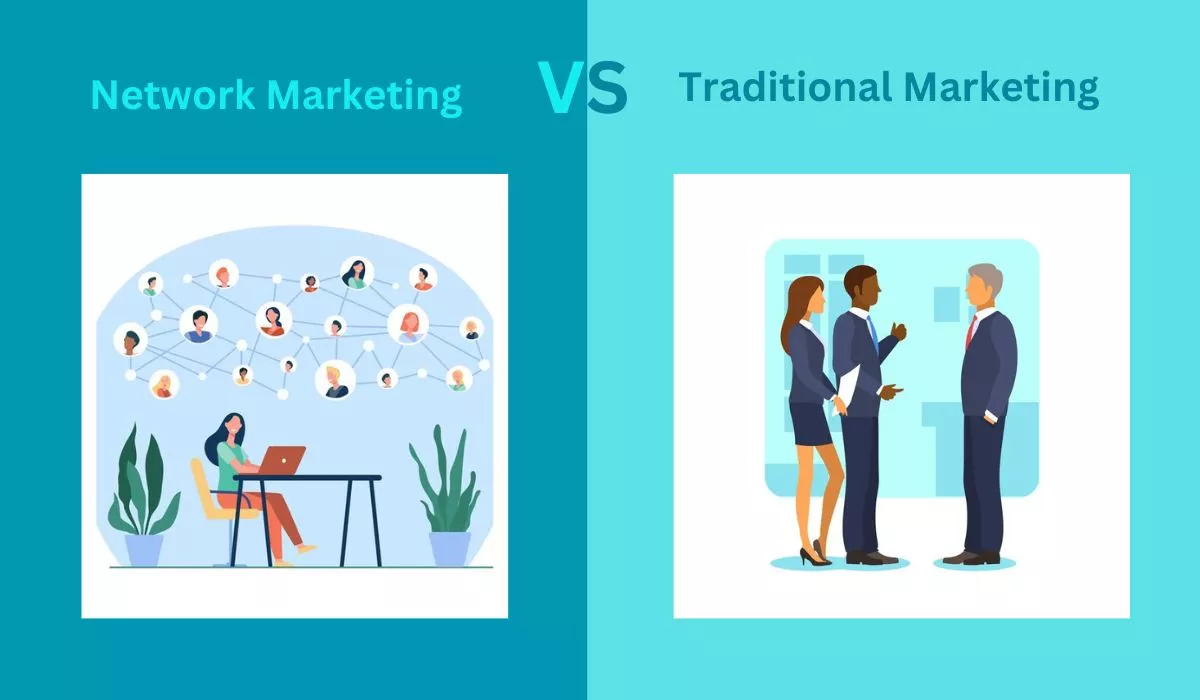Marketing is an age-old business tactic employed to entice consumers into buying products. Over the years, marketing tactics have evolved significantly allowing wider reach and better results. Network marketing is one such innovation that diverges from the traditional route and emphasizes more on the collective efforts of individuals and direct engagement.
This poses a challenge for individuals venturing into the marketing realm – follow the tried and tested route of traditional marketing or embrace the hugely popular network marketing.
If you are facing the same dilemma, here’s a comprehensive take on traditional marketing vs network marketing. In this comparison, we will dissect key characteristics, advantages, and downsides of both marketing models. The insights will help you pick the model that best aligns with your business goals.
Traditional Marketing Explained – Complete Overview
Let’s begin with the tried and tested model of traditional marketing. It’s the kind of marketing tactic that we encounter every day, but may not notice. Every ad in TV, newspapers, and magazines is a marketing campaign trying to get our attention.

The model works like this – there’s an established channel like a store or an outlet associated with a brand. Companies hire people to handle the coming customers, resolve their queries, tell them the benefits of the products, and eventually convert them into buying customers.
Take the example of Coca-Cola – a well-known company that excels in traditional marketing. You might have seen their multitude of ads on TV, billboards, and magazines with their iconic red and white logo. These marketing campaigns are crafted to catch the attention of consumers and connect with them on a large scale.
Network Marketing Explained – Key Characteristics
Alright, now let’s delve into network marketing models. It follows the centuries-old practice of door-to-door marketing but with a twist. A network marketing company doesn’t hire individuals on a salary basis to sell their products.
Instead, it partners with independent distributors that sell products on their behalf. But the real twist is, that these distributors can onboard other members to promote the product as well, thus forming a network.

In return, distributors receive payouts for both their sales and recruitment efforts. Not only that, they also take away a small percentage from the sales and recruitment efforts done by the members they added to the network.
The collective efforts of the network in MLM is its real strength that enables network marketing companies to grow considerably in a short time.
Take for example the case of Amway, a hugely popular network marketing company. In Amway’s model, members become Independent Business Owners (IBOs). Amway offers them products at discounted prices which they sell further, thus making money on the sales.
Likewise, they can also recruit other IBOs and grow their network. This way, the team grows as well as sales and commission enabling members to earn significantly.
What Are The Pros and Cons of Network Marketing?
Okay, so the unconventional approach of network marketing promises quick success. But is it all roses or there are some hurdles to it? Let’s find out by exploring its pros and cons
Pros
- Low Startup Cost – It’s a big advantage of network marketing. You don’t have to put a dent in your pocket to venture into MLM.
- Good Flexibility – There are no fixed hours in network marketing. You can work at your ease, from the location of your choice. It’s perfect for those seeking work-life balance.
- Significant Earning Potential – In network marketing, there isn’t a limit on your earnings. It all depends on the efforts you put in – more sales and recruitment translates to more money, simple.
Cons
- Concerns of Pyramid Schemes – Pyramid schemes are real and potentially harmful to MLM business. Therefore it’s crucial that you pick a reputable MLM company.
- High Competition – Competition is fierce in network marketing primarily due to its popularity. Also, the entry barrier is low which further pushes the competition up.
What Are The Pros and Cons of Traditional Marketing?
Now let’s shift our focus to traditional marketing, the model that has been a cornerstone of business success for decades.
Pros
- Established Model – Traditional marketing has stood the test of the time. Therefore it offers a more sustainable growth model.
- Wider Reach – With traditional marketing channels, you can put your message to a massive audience. It ensures you reach as many people as possible.
- Brand Consolidation – Traditional marketing campaigns lead to strong brand recognition. Reputable brands stick in mind, boosting the possibility of sales.
Cons
- High Cost – Traditional marketing is quite expensive, so you will need a hefty upfront investment.
- Limited Interactions – Traditional marketing is a one-way communication. There’s no direct interaction with the audience.
The Wrap-Up – Which Model is Right For You?
Now you know the workings of both traditional marketing and network marketing. While traditional marketing offers better recognition, network marketing has come out as an attractive alternative. That said, marketing is an ever-evolving landscape, therefore understanding the merits and limitations of both models is vital to ascertain which is best for your business.


